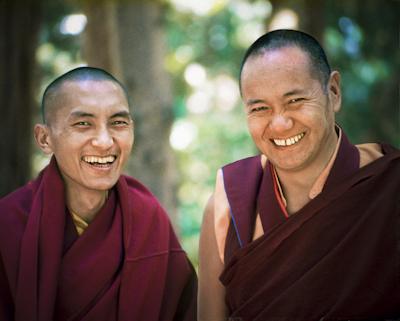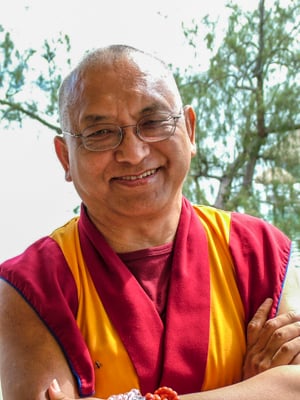Dear LYWA supporters,
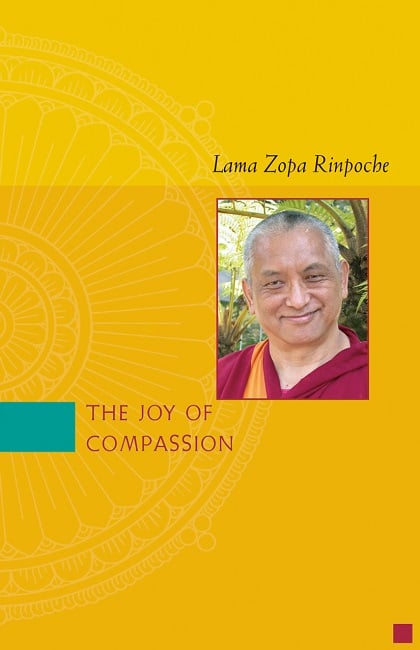 Thank you so much for reading our e-letter. We have exciting news to share...
Thank you so much for reading our e-letter. We have exciting news to share...
Our New Books Are In! The big news around here is that our new books have finally come in and we’re already busily sending them out all over the world. This week we’re sending sea freight shipments to Wisdom Books in London (our European distributor), FPMT Australia (our Australian distributor), and all New Zealand FPMT centers.
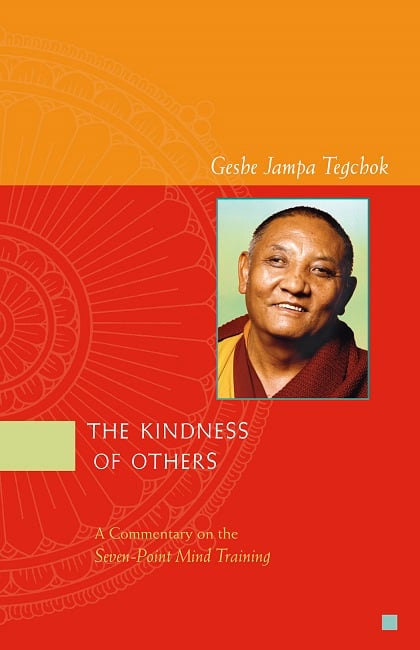 Which books? Lama Zopa Rinpoche’s The Joy of Compassion and Geshe Jampa Tegchok’s The Kindness of Others, and they’re obviously available on line. We’ve also reprinted Lama Yeshe’s The Essence of Tibetan Buddhism, the teachings on which are also available on DVD; the audio is on our Web site, too.
Which books? Lama Zopa Rinpoche’s The Joy of Compassion and Geshe Jampa Tegchok’s The Kindness of Others, and they’re obviously available on line. We’ve also reprinted Lama Yeshe’s The Essence of Tibetan Buddhism, the teachings on which are also available on DVD; the audio is on our Web site, too.
Thank You to Our Book Sponsors
I’d like to thank our kind sponsors for helping us make these books available: the Lai family for sponsoring The Joy of Compassion in memory of the late Tung-Ming Lai, the Saraswati Buddhist Group in Somerset, England, for The Kindness of Others and Doss McDavid of San Antonio, Texas, for The Essence of Tibetan Buddhism. Thank you all so much.
And if you’re interested, we need sponsors to reprint Lama Yeshe’s The Peaceful Stillness of the Silent Mind, and there are a couple of new books of teachings by Lama Yeshe and Lama Zopa Rinpoche also requiring sponsorship. Please contact me if you’d like to participate in bringing these teachings to light for the benefit of others.
Lama Zopa Rinpoche's Advice Book
We continue to add new advices to Rinpoche's online Advice Book—we now have over 270 advices posted! This month we updated the Health section with new advices to those with cancer, advice regarding arthritis and hepatitis, and many advices on a variety of health issues in the "Other Illnesses" page. You can also read Rinpoche's advice regarding lung, or wind imbalance, in the Practice Advice section, and advice on counteracting spirit harm in the Miscellaneous Advices section.
Listen Online
This month's podcast is the conclusion of the first day's teaching given by Lama Zopa Rinpoche in Barcelona, Spain this past September. You can also listen to this teaching and many others on our Online Recordings page.
This Month's Teaching
I've recently finished editing a text on The Practice of the First Three Perfections, which is drawn from Lama Zopa Rinpoche's text Wish-Fulfilling Golden Sun. We’re happy to offer you the teaching on the first perfection, Charity. The next two perfections will follow in the April e-letter.
Thank you so much for your interest in and support of the Lama Yeshe Wisdom Archive.
Much love,
Nick Ribush
Director
The Practice of the First Three Perfections
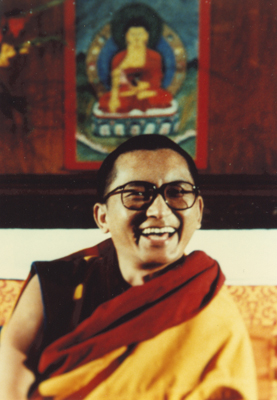 There are five headings under which each perfection [Skt: paramita] can be considered:
There are five headings under which each perfection [Skt: paramita] can be considered:
1. The meaning of the perfection
2. How to practice the perfection
3. The divisions of the perfection
4. What should be done in the practice of the perfection
5. The conclusion
A. Charity
1. The Meaning of Charity
Practicing charity (generosity, giving) means having the will to dedicate our body, possessions and merits to others and making the actions of body and speech with this virtuous motivation.
[OED: Without any especially Christian associations: love, kindness, affection, natural affection; now especially with some notion of generous or spontaneous goodness.]
2. How to Practice Charity
The way to practice the paramita of charity is to develop the will to give in many ways. The destruction of miserliness in only the body and possessions is not called the paramita of charity. Miserliness is part of greed, so even the lower arhat has to completely avoid even the seed of it. Therefore, as well as destroying the clinging miserliness that interrupts charity, it is also necessary to arouse the will to give from the heart even all the results received from virtuous actions.
To be able to make charity, we should follow the method of meditating on the shortcomings of miserliness and greed, thinking how the body and possessions are trivial and betray those who seek to gain peace. We should cut attachment to our body by seeing it as illusory, a magic creation or a dream, and by thinking that it is dirty, a collection of impurities.
We should think like this: “I am foolish not to train my mind in the ways that bring countless and boundless successes to myself and others—dedicating my body, which is inconsequential and has to be left, no matter how well I take care of it.’’ By thinking in this way we should try to arouse the thought of giving to others as much as possible.
We should also remember Shantideva’s words:
One attains liberation by dedicating all; one’s mind achieves enlightenment at the same time leaving all. So it is best to dedicate to sentient beings.
We should make charity of whatever merits are created, great or small, dedicating from the heart to obtain the greatest peace for sentient beings: temporary peace and ultimate peace. Hence, we complete an infinite accumulation of merits quickly, because we receive merits from each of the numberless sentient beings.
In his Jewel Garland, the great pandit Nagarjuna said,
If all the merits received from saying prayers such as the dedicating prayer were to become matter, they could not fit into even the number of universes equal to the number of grains of sand in the Ganges. This was said by Guru Shakyamuni and can also be realized logically: the world of sentient beings is infinite and so the benefits of the wish are that much.
After we have thought much about the benefits of giving, the shortcomings of keeping and the bodhisattva’s holy actions of making charity, the thought of giving can arise spontaneously in us. Whoever destroys the craving for possessions and trains in the thought of giving to others is called a bodhisattva.
It is also necessary to train in the thought of dedicating our body, but although we completely dedicate our body to others we don’t have to actually sacrifice it now, only when our will has become ready and powerful enough. On the contrary, sacrificing our whole body physically before we have reached the appropriate level of mental development will interrupt our Dharma practice. It is wrong to think that it is hypocritical to sacrifice the body mentally without giving it physically.
When we practice each of the six paramitas it should contain:
(a) All six paramitas, and
(b) The six holy things
(a) Practicing charity with the six paramitas: not practicing each paramita with the others included greatly interferes with the success of the bodhisattva’s actions, just as a soldier who does not wear proper armor or carry weapons runs the risk of incurring a fatal injury.
(i) The morality of charity. When we make charity with bodhicitta we should avoid all negativities of body, speech and mind, otherwise we break the precepts of morality, which will cause us to suffer in the lower realms.
(ii) The patience of charity. We must also practice charity with patience and not get angry with those who react badly to our charity by speaking harshly or showing displeasure. Without patience we run the risk of anger destroying our merits.
(iii) The energy of charity. We must practice charity with continual, strong energy to avoid becoming lazy, thinking that we’ll be able to make charity at some later time.
(iv) The concentration of charity. We need to think single pointedly of the benefits of making charity and the shortcomings of not. If we don’t engage the single pointed concentration that prevents us from falling under the control of delusion our virtue is in danger of being stolen by the thief of distraction.
(v) The wisdom of charity. Finally, at the time of making charity, it is necessary for the discriminating wisdom to be checking, “This should be practiced, that should be abandoned,” lest the practice be made incorrectly, with corrupt actions. But especially, charity should be made with the wisdom concentrating on the circle of the three—subject, object and action—in emptiness; otherwise the practice will not become a pure, bodhisattva’s action.
(b) Practicing charity with the six holy things
(i) The holy subject: bodhicitta motivation.
(ii) The holy possession: always having bodhicitta, not only when making charity of ordinary possessions but even when charity of a special object is made.
(iii) The holy purpose: making charity to give temporary happiness to sentient beings to benefit for the ultimate goal.
(iv) The holy skill: making charity possessed by the wisdom of emptiness.
(v) The holy dedication: dedicating the merits of charity to achieve enlightenment.
(vi) The holy purity: the purification of delusions and mental defilements.
Each paramita should also be practiced with the four actions:
(i) Dedication: dedicating our body to all sentient beings from the heart.
(ii) Protection: having dedicated our body to sentient beings we should protect it from being wasted in meaningless actions.
(iii) Purification: making charity of the body a pure practice by concentrating on the circle of the three in emptiness.
(iv) Increase: dedicating the merit of our charity to all sentient beings, equal to the sky, for their achievement of enlightenment. We must not get shocked, thinking that if we dedicate all our merits to sentient beings there won’t be any left for us—dedication is mental, so there’s nothing wrong with it. On the other hand, we must not think that dedicating mentally is pointless because there’s nothing for others to receive.
The way to complete the paramita of charity is to complete the training in the thought of giving even the merits of virtuous actions, let alone abolishing miserliness in our possessions—not completely eradicating starvation and thirst or satisfying the last beggar. If it did, then all the past buddhas such as Guru Shakyamuni would have yet to complete the practice of charity, having reached enlightenment by mistake.
Those who have renounced the worldly life and are living in ordination should not put effort into collecting materials with which to make charity if this interrupts their meditation, listening to teachings and leading a virtuous life. In their case, making material charity is not so important, but if, due to past karma, they have received many materials effortlessly without interruption to their practice of virtue, then they need to make material charity.
3. The Divisions of Charity
(a) The charity of Dharma: this includes showing the Dharma purely, giving ordination, teaching handicrafts such as religious paintings and mandala construction, teaching the alphabet and grammar and saying mantras and prayers motivated by Dharma charity, visualizing ourselves surrounded by all sentient beings listening to it.
(b) The charity of fearlessness: this includes saving beings from dangers caused by humans, animals or the elements.
(c) Material charity: there is actual physical charity and mental charity. How should we make material charity? The recipient of our charity is another living being. What kind of motivation is necessary?
(i) Necessity. We should think of the necessity: “Through this action I will complete the paramita of charity and become fully enlightened.”
(ii) Possessions. We should regard our possessions in this way: as bodhisattvas have dedicated everything to sentient beings and consider all things to be the possessions of others, we should think that anything with which we make charity is actually belongs to the other and that we are returning something that we were given for safe keeping to its rightful owner.
(iii) Recipient. We should consider that the being to whom we’re making charity is our guru, helping us to complete the paramita of charity. If the recipient of our charity is an enemy, we should make charity with a loving thought. If the recipient is suffering and miserable, we should make charity with compassion. If the recipient is knowledgeable, we should make charity with a rejoicing mind. If the recipient is a friend, a temporal helper, we should make charity with equanimity.
4. What Should Be Done in the Practice of Charity
(a) What thoughts are deluded and should be abandoned when charity is made?
(i) Ignorance: the erroneous conception that charity has no result.
(ii) Pride: thinking, for example, that we are teaching a beggar, competing with others or, ‘‘I am so generous, others cannot give as I do.”
(iii) Dependence: expecting to receive something in return—good reputation, gratitude and so forth.
(iv) Discouragement: we should not be discouraged by the difficult, extensive bodhisattva’s charity. Before making charity our mind should be happy, while making charity it should be calm, and afterwards, we should not regret having made it.
(v) Partiality: we should not be biased but make charity with impartial compassion for both enemy and stranger.
(vi) Expectation: without the slightest thought of reward for ourselves, we should think that the recipient of charity is completely devoid of happiness and has no ability to remove suffering. Without “thought of reward” means that we must think not only of the results of charity, such as receiving a perfect human rebirth or perfect possessions in future lifetimes, but also that possessions are inconsequential and focus more on the benefits of enlightenment that making charity brings.
(vii) Fear: while making charity we should not feel afraid of becoming poor in the future or have treacherous thoughts of betraying the recipient of our charity.
(viii) Malice: if we perceive that the recipient of our charity has certain faults, we should not have the evil thought of announcing what we have seen.
(b) With what actions should charity not be made?
(i) We should not give small amounts or inferior articles, justifying such actions by reminding the recipient how much we gave before or how generous we are.
(ii) We should not make charity by compelling the recipient to perform negative actions such as killing or destroying or to carry out very hard work such as that usually done by animals.
(iii) If we’re a king we cannot deprive one family of their son or daughter and make charity of the child to another.
(iv) We should not make charity of materials taken by force from our parents or servants.
(v) We should not make charity with the intention of harming a third party.
(vi) While making charity we should not frighten the recipient with harsh words, for example, abusing a beggar for not working.
(vii) We should not break precepts to make charity.
(viii) We should not avoid making charity while accumulating possessions, making it only after collecting for a long time.
(c) With what actions should charity be made?
(i) Without harming others.
(ii) By bearing difficulties and troubles as they arise.
(iii) By our own hand, with respect for the recipient.
(iv) With sincere words.
(v) With a pleased and smiling face.
Each of these actions has its own result.
(d) Actions that help others make charity
(i) If we have materials with which to make charity, we can go to miserly people, those who have never made charity with pleasure or good feelings, and tell them that we have such and such a possession and need to complete the practice of charity, for which a beggar is required, so that if they see any beggars could they please bring them to us.
(ii) We can give our possessions to another and ask him to give them to the beggar.
(iii) We can advise the miserly person to try to rejoice at our charity.
In such ways we plant the seed to dispel miserliness and by helping others in this way we create much merit.
(e) Which materials should be given and which should not?
(i) We should give whatever material brings the recipient future benefit of following the virtuous path, but if that material is likely to cause future harm it should not be given, even though it might give temporal pleasure.
(ii) Our body. We should not give our body if somebody begs us for our body before the time is right—that is, before we have developed the great compassion that allows us to give our body without feeling upset—or even a part of our body if it is more beneficial for sentient beings that it continue to exist. Similarly, we cannot make charity of our body to the wrong recipient; if it’s going to be killed or used for some other evil purpose, causing us harm; for killing another; or to those whose thoughts are evil because they are possessed by spirits or crazy. Giving our body to such recipients breaks our bodhisattva precepts.
Which possessions should not be given?
(i) According to time, for example, obliging someone living in eight, thirty six or two hundred and fifty three precepts to take an evening meal.
(ii) According to the material object, for example, obliging ordained people to take things they cannot, such as garlic, meat or wine, or to give them such things as food left on others’ plates or dirty food. Also we cannot make charity of
• Statues, holy texts and so forth to those who do not have devotion or a sincere desire to understand their meaning but regard such things as merely material;
• Our parents;
• Monks’ robes;
• Poison, weapons or similar things with the potential of harming living beings to those who plan to injure others with them; nor can we teach techniques such as shooting to those who ask with the intention of harming others or ourselves with them. If, however, somebody asks for poison, weapons, wine and so forth in order to use them for the benefit of other living beings, we can make charity of such things.
If there are two beggars, one better off than the other, and we cannot fulfill the desires of both, we should, with a pleasant expression and a sweet tone, tell the former, “This portion has already been dedicated to this other poor man so please do not think that I do not care about you.’’
(f) What should we do if, although not wanting of possessions, we cannot make charity because of miserliness? We should think like this: ‘‘It is inevitable that this object and I shall separate—it will leave me and I shall leave it. Therefore I prepare for death by extracting its essence and making my mind joyful.’’
(g) How we should practice the remedies that overcome obstacles to making charity
(i) Not being familiar with making charity. If despite having material possessions we still do not want to give, we should realize that this is the result of having had similar thoughts in previous lifetimes and that if we continue to avoid giving we will continue to be averse to it in future lifetimes. Therefore we should not allow ourselves to remain unused to making charity.
(ii) Not wanting to give because of lacking material possessions. The remedy for this is to think, ‘‘Since I have suffered hunger, thirst and many other unbearable samsaric sufferings and because delusion and karma have prevented me from benefiting others, instead of sending this beggar away empty handed it would be better for me make charity, even should it cost me my life, which itself is the result of benefiting others. Anyway, I can always live by eating plants, even though there’s no enjoyment.” Accepting that difficulty, we should then make charity.
(iii) When the thought of giving does not arise because of extreme attachment to beautiful things it is necessary to immediately remember the shortcomings of greed, especially that the wrong belief that this enjoyment or pleasure is actually suffering brings only continual suffering in future. The charity of the greatly wise bodhisattvas is mental charity, the mental transformation of the extensive and varied enjoyments that exist into infinite offerings. They meditate truly from the heart that all are given to sentient beings with complete, pure bodhicitta, taking more care of others than themselves, without difficulty and with such skill that it creates incredible merit and brings endless benefit. While this is a practice that can be done by those who do not possess materials with which to make physical charity it does not mean that those rich in possessions cannot also do this practice.
5. Conclusion
Whoever takes bodhisattva vows should understand the importance of following the practice of charity as explained, starting immediately, and pray to be able to follow the hardest practices of charity on the higher levels in future. We should feel pleased to practice developing the thought of giving through being detached from our body, possessions and merit and displeased not to train in developing this thought. We should remember that if we abandon this practice we will be breaking our precepts and in future lives will find it extremely difficult to follow the bodhisattva’s deeds.
From Lama Zopa Rinpoche’s Wish-fulfilling Golden Sun. Edited by Nicholas Ribush. The pdf of Rinpoche's original version can be found here.
























